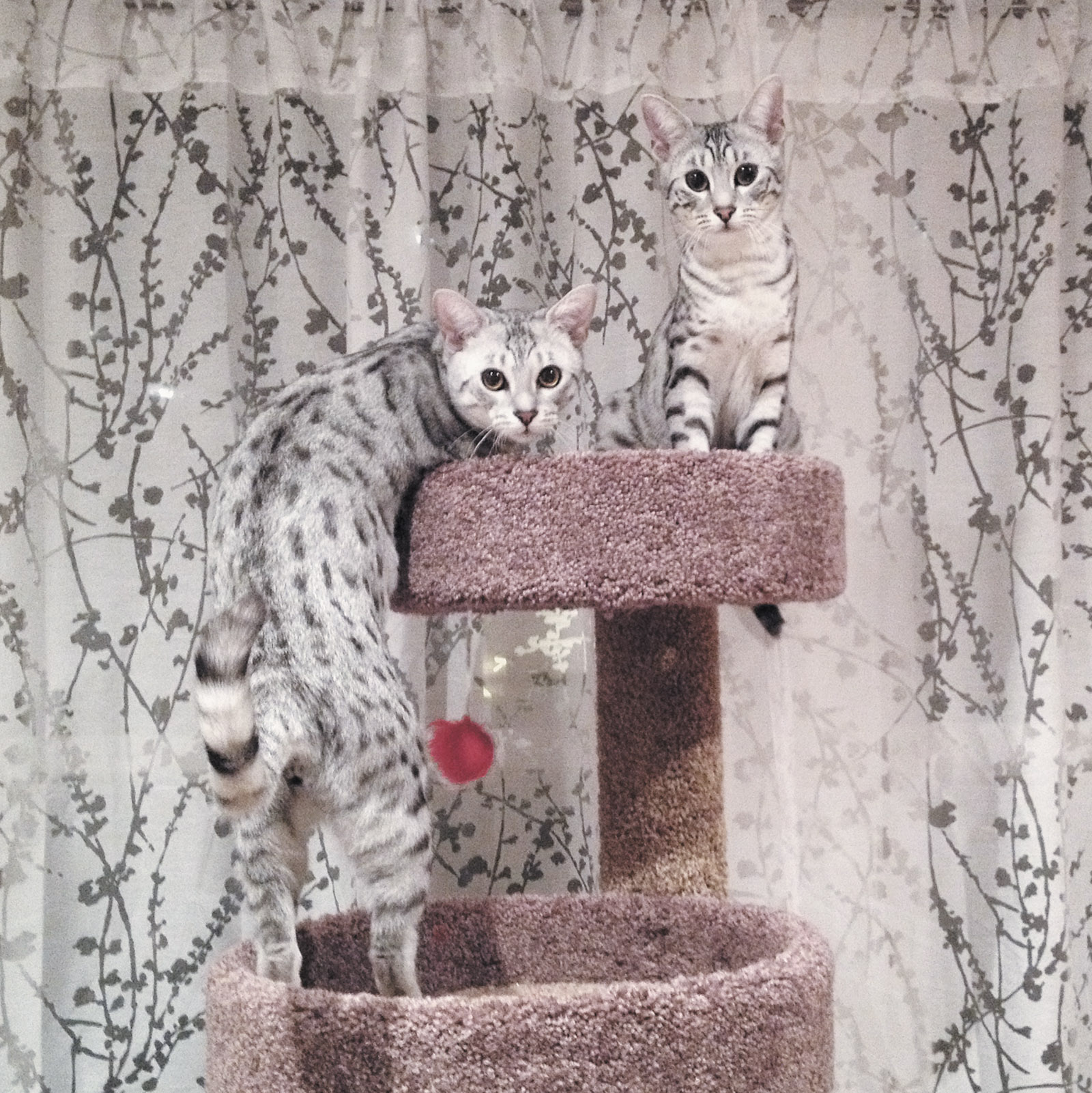In response to:
The Killer Cats Are Winning! from the September 29, 2016 issue

Pamela Chen
Indoor cats Apollo and Bean, Washington, D.C., 2014; photograph by Pamela Chen from her book Apollo and Bean, just published by 10(X) Editions
To the Editors:
Responsibly safeguarding the welfare of America’s homeless cats requires a high level of fairness and integrity. That’s why we were disappointed by the blatant anti-cat bias and misinformation in Natalie Angier’s review of Cat Wars: The Devastating Consequences of a Cuddly Killer, by Peter P. Marra and Chris Santella [NYR, September 29].
First, Angier unfairly presents cats as a fixed and an inherently flawed species who “cannot be tamed or herded” and are “wild at heart.” Cats, in fact, are highly adaptable and trainable, can be very social, and absolutely give and receive love. Strong legal protections that society provides for cats also illustrate wide public support for their welfare.
Angier also blindly reiterates some of Marra and Santella’s most arguable charges, asserting that cats “butcher tens of billions of songbirds…and push vulnerable species toward extinction.” A more careful read of the research—some coauthored by Marra himself—reveals that the impact of outdoor cats on birds is inconclusive and imprecise, especially when influential factors like construction, roads, pollution, pesticides, and destruction of habitat are considered.
Given all possible approaches to shrinking community cat populations, TNR (trap, neuter, return) is the most humane and responsible. It will not only provide life-saving options for cats who might otherwise be euthanized in shelters, but can also stabilize, and even reduce over time, community cat colony populations.
In a scientific poll from a 2007 policy brief by Alley Cat Allies, respondents were asked to choose the more humane of two approaches: leaving stray cats where they are or putting them down. Eighty-one percent recommended leaving the cat in its home environment. By contrast, the solution offered by the book’s authors—elimination of all community cats—is not only callous and unworkable, but, in many cases, illegal.
Such vilification of cats as “cuddly killers” doesn’t just affect their reputations; it endangers their lives. With tens of millions of stray cats in America and roughly half of all shelter cats euthanized every year, unnecessary obstacles to adoption or responsible community management only put innocent cats—along with our own humane integrity—in further peril.
Margaret R. Slater
DVM, Ph.D.
Senior Director of Veterinary Epidemiology for the American Society for the Prevention of Cruelty to Animals
Northampton, Massachusetts
Natalie Angier replies:
First let me say for the record that I am a cat lover who has had pet cats—and only pet cats—my entire life. I in no way consider cats “an inherently flawed species,” but I do think they are, as a rule, less group-oriented and eager to please than dogs are, which is what you’d expect given their divergent evolutionary roots: most canids are social and live in packs, while most cat species, including the wildcat that gave rise to the domestic cat, are solitary and fend for themselves. A 2015 report in the journal PLOS One examined the relationship between twenty cat owners and their pets and concluded that the cats were not strongly attached to their owners or dependent on them for “a sense of security and safety,” results “consistent with the view that adult cats are typically quite autonomous, even in their social relationships.” To which I and many like-minded cat lovers would say, advantage cats! “If you wanted a needy, neurotic, whimpering, love-struck, pathetically dependent whipping boy,” Rowan Pelling wrote in The Telegraph, “you would have bought yourself a dog.”
As for the impact that free-ranging cats have on birds, small mammals, and other wildlife, yes, the numbers are difficult to pin down, but they are undeniably large. That is why the International Union for Conservation of Nature, the premier tracker of endangered and threatened wildlife, lists the domestic cat as one of the hundred worst invasive species. Nevertheless, I made clear in my review my aversion to Marra and Santella’s draconian proposal that all free-roaming cats be rounded up and exterminated. The effectiveness of so-called trap-neuter-return programs in reducing the free-ranging, unowned cat population has yet to be demonstrated, but at times it’s probably fine to leave colonies of neutered and vaccinated cats alone, rather than ship the animals off to the local gas chamber.
We’re talking homeless cats here. If you’re a cat owner, please don’t add to the problem. Autonomy is a state of mind: keep your pet cat inside.



